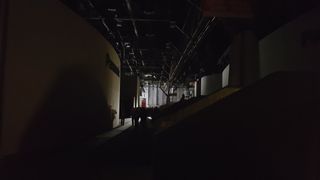CES 2018 Plunged Into Pre-Industrial Darkness

LAS VEGAS, NV -- Ah, CES. That yearly Mecca of technology, where exhibitors, journalists, and industry experts gather to experience the latest and greatest inventions of mankind. If you've never attended, you don't need much to make the most of CES—just some interesting new technology, a few good friends, and a healthy helping of Las Vegas showmanship.
Oh, and electricity. You need electricity. Which the attendees of CES 2018 briefly didn't have access to because of a mysterious blackout. Whoops.
CES sent the following statement to attendees to explain the outage:
Today at approximately 11:15 AM, the Central Hall and South Hall bridge meeting rooms at the Las Vegas Convention Center lost power. Power in the South Hall was restored within minutes, and power has now been fully restored to all areas. A preliminary assessment indicates that condensation from heavy rainfall caused a flashover on one of the facility's transformers. We are grateful to NV Energy for their swift assistance, to our customers and their clients for their patience and to the staff for ensuring the safety and security of all attendees and exhibitors.
As CES got things straightened out, we continued bringing you the latest and greatest stories from the show. (CES isn't confined to a single building, after all; it takes place in hotels and expo halls all around the Las Vegas strip.) Fortunately, the blackout didn't last until our colleagues' phone batteries run out, leaving them in a "Mad Max"-style dystopia. Viva Las Vegas!
This post was written by Marshall Honorof
Stay on the Cutting Edge
Join the experts who read Tom's Hardware for the inside track on enthusiast PC tech news — and have for over 25 years. We'll send breaking news and in-depth reviews of CPUs, GPUs, AI, maker hardware and more straight to your inbox.

Nathaniel Mott is a freelance news and features writer for Tom's Hardware US, covering breaking news, security, and the silliest aspects of the tech industry.
-
InvalidError Condensation in a power room? Either they need to weather-proof their equipment, do something about recycling the equipment's waste heat to get rid of excess moisture or deploy dehumidifiers. Power rooms usually have far more than enough waste heat to keep themselves well above dew point and not have condensation in the first place.Reply -
bit_user Reply
Pretty sure you don't put transformers needed to power those convention halls on poles (or indoors). It was probably on a concrete pad, where the waste heat can be vented directly to the atmosphere.20581773 said:@invaliderror, it was most likely a transformer on the pole outside.
This?
https://www.google.com/maps/place/Las+Vegas+Convention+Center/@36.1330425,-115.1509965,52m/data=!3m2!1e3!5s0x80c8c4665d150741:0xcedf47f456a54bb1!4m5!3m4!1s0x80c8c46640af22e7:0xa93a4afe2fe7b046!8m2!3d36.131998!4d-115.1516808 -
turkey3_scratch Personally I love power outages. They're kind of fun. For me, that is. Not good for the elderly, though, and people who need the power.Reply -
bit_user Reply
I guess they can be fun in the same way kids like snow storms - they do break the routine. That said, I can't see any upside other than checking our sense of complacency about infrastructure.20582379 said:Personally I love power outages. They're kind of fun. For me, that is.
Seriously, if you need a power outage to give you some excitement, I think you should get out more.
-
InvalidError Reply
If the transformer was outdoors, it should have been weatherproof and a bit of condensation would have been a non-issue as outdoors transformers are designed to be flat-out rained on without issue.20582365 said:Pretty sure you don't put transformers needed to power those convention halls on poles (or indoors). It was probably on a concrete pad, where the waste heat can be vented directly to the atmosphere.
If condensation caused something to flash over and blow fuses / trip breakers, that sounds distinctly like something that could only happen if the electrical installation was in a normally dry location and the equipment non-weatherproofed. Either that or a failing insulator. -
bit_user Reply
Fair enough.20582388 said:If the transformer was outdoors, it should have been weatherproof and a bit of condensation would have been a non-issue as outdoors transformers are designed to be flat-out rained on without issue.
If condensation caused something to flash over and blow fuses / trip breakers, that sounds distinctly like something that could only happen if the electrical installation was in a normally dry location and the equipment non-weatherproofed. Either that or a failing insulator.
I'm skeptical it was really condensation, BTW. Maybe that was the most exculpatory answer they could give, but I suspect something more along the lines of leaks or splatter, as you're suggesting. If you look at the time of the outage (11:15 AM), I wonder whether the equipment would still be cold enough to facilitate much condensation. Also, there's your point about abundant waste heat.
I think the step-down transformers are probably shown in the above link, but I'm not totally sure as Vegas seems to use underground transmission lines? -
InvalidError Reply
Having underground feeds doesn't exclude having above-ground transformers fed by those underground lines. Some neighborhoods where I live have underground feeds with above-ground transformers on concrete pads. Waste heat on those is enough to self de-ice in winter and those are merely 25-50kVA. For the convention center, we're likely talking 200+kVA.20582406 said:I think the step-down transformers are probably shown in the above link, but I'm not totally sure as Vegas seems to use underground transmission lines? -
BulkZerker It wasn't condensation getting in, it was from rainfall getting past weather seals, which does happen. Especially during down-pour conditions. Which the Mojave desert is famous for having, and giving the Vegas area the brunt of the water flowing down from the mountain ranges.Reply
Most Popular

